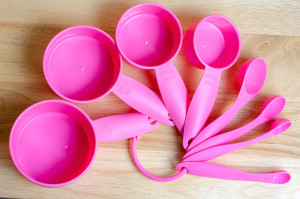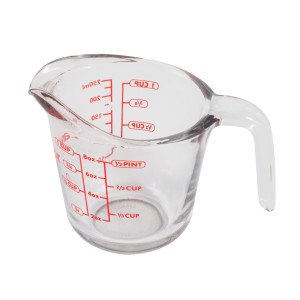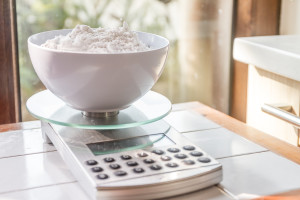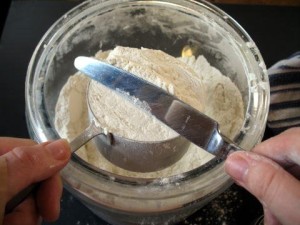


Measuring ingredients: Choose the right tool!
When a recipe calls for a dry ingredient like flour, sugar, oats, dried beans, or rice, you need to use measuring cups made for this purpose. Why? Because dry measuring cups let you level the amount of the ingredient at the top (using a spatula or the flat edge of a knife), producing the exact amount you need. This precision might not be important if you're making your favorite chili but if you're baking, precision is critical to get the result you want! If you use a liquid measure to measure dry ingredients, you'll invariably end up with more than you want.
When a recipe calls for a liquid like water, milk, molasses..., you can use a dry measuring cup, but if you're anything like me, I don't advise it. I tend to be a messy cook, and spilling part of the cognac or milk on the counter doesn't improve your product! So invest in at least a 1-cup liquid measuring cup that has extra space at the top; microwave-safe glass is the most practical choice. To make sure you get that last drop of sticky liquids like honey or molasses, lightly spray the measuring cup with cooking oil spray before pouring the sticky liquid into it.
What about kitchen scales? I recommend that everyone have a small digital kitchen scale, ESPECIALLY if you're trying to lose weight! If you love to bake, weighing your dry ingredients is more accurate than using even the most expensive (heavy duty) dry measuring cups, because dry ingredients can settle with time and because we all tend to add ingredients to our measuring cups a little differently (you might sometimes see the phrase, "Use the dip and sweep method for measuring flour," because lightly dipping your cup into the flour and sweeping across the top helps keep the flour from packing too tightly).
 Some very accurate recipes or cookbooks will specify both the weights and volumes (cups) of the ingredients (for example, "1 cup all-purpose flour [4 1/4 ounces]"). If you really get into weighing your ingredients, you can easily Google the weights of, say, a cup of all-purpose flour, whole wheat flour, or granulated (white) sugar: Believe me, they are VERY different!
Some very accurate recipes or cookbooks will specify both the weights and volumes (cups) of the ingredients (for example, "1 cup all-purpose flour [4 1/4 ounces]"). If you really get into weighing your ingredients, you can easily Google the weights of, say, a cup of all-purpose flour, whole wheat flour, or granulated (white) sugar: Believe me, they are VERY different!
Why do kitchen scales help with trying to lose weight? Because nothing is more eye-opening than finding out that what you thought was a 1-ounce muffin (or fill in your favorite food) is really 8 ounces!